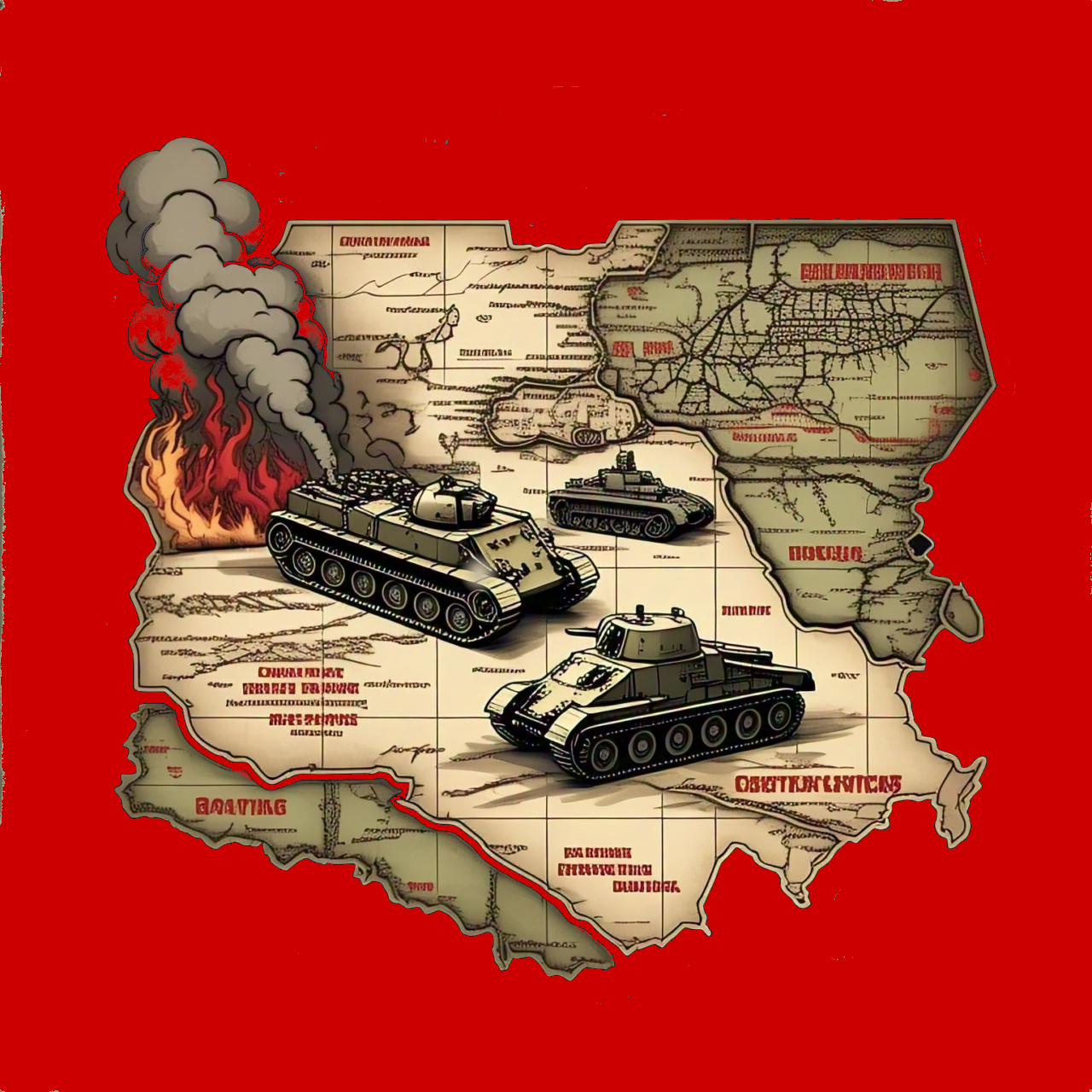12th Soviet Army
The 12th Soviet Army formed in 1939 from the Southern (Cavalry-Mechanised) Army Group of the Kiev Special Military District. It participated in the Soviet invasion of Poland that same year. The army later fought in World War II as part of the Southwestern Front, facing German forces in the frontier battles.

Commanders
Major General Ivan Tyulenev, 26th July 1939 to 23rd October 1939

Major General Ivan Tyulenev served as a distinguished Soviet military leader with a long and decorated career. He commanded the 12th Army during the invasion of Poland in 1939, demonstrating his strategic capabilities. Tyulenev later led the Southern Front in the early stages of World War II, facing the German invasion.
Colonel Filipp Parusinov, 22nd October 1939 to 3rd March 1941

Colonel Filipp Parusinov commanded the 12th Soviet Army during a critical period of World War II. He led the army in the early defensive battles against the invading German forces. Parusinov faced overwhelming challenges as the Red Army struggled to contain the German advance. His efforts and sacrifices highlight the difficult situation faced by Soviet commanders during the initial stages of the war.
Major General Pavel Ponedelin, 11th March 1941 to 10th August 1941

Major General Pavel Ponedelin bravely commanded the 12th Soviet Army during the initial period of World War II. He led the army in the difficult defensive battles against the German invasion. Ponedelin faced overwhelming odds as the Red Army struggled to contain the enemy advance.
Major General Ivan Galanin, 25th August 1941 to 16th October 1941

Major General Ivan Galanin bravely led the 12th Soviet Army during a challenging period of World War II. He assumed command after the devastating Battle of Uman, inheriting a battered force. Galanin directed the army in defensive actions around the Donbas region.
Major General Konstantin Koroteev, 16th October 1941 to 15th April, 1942

Major General Konstantin Koroteev demonstrated notable leadership during a critical phase of World War II. He commanded the 12th Soviet Army during the challenging battles in the Donbas and Rostov regions. Koroteev led the army in defensive operations against relentless German attacks.
Major General Andrei Grechko, 15th April 1941 to 3rd September 1942

Major General Andrei Grechko commanded Soviet forces during World War II, showcasing exceptional leadership and strategic brilliance in critical battles. He led the 12th Army and later the 18th Army, achieving significant victories in the Caucasus and Ukraine. Grechko also contributed to the Soviet invasion of Poland, demonstrating unmatched tactical expertise and determination.
Colonel Aleksandr Sokolski, 4th September 1942 to 13th September 1942

Colonel Aleksandr Sokolski commanded artillery units during World War II, showcasing exceptional leadership and tactical expertise in critical operations. He led artillery forces in the Barvenkovo–Lozovaya offensive and the Battle of the Caucasus. Sokolski also contributed significantly to the Soviet victory in the Crimean Offensive, demonstrating unmatched dedication and strategic brilliance.
Lieutenant General Nikolai Kirichenko, 13th September to 20th September 1942

Lieutenant General Nikolai Kirichenko briefly commanded the 12th Soviet Army during World War II. He assumed command after a series of leadership changes, inheriting a depleted force. Kirichenko oversaw the army’s reorganization and transfer before its disbandment.
Lieutenant-General Ivan Shlemin, 20th April 1943 to 5th May 1943

Lieutenant-General Ivan Shlemin commanded Soviet forces during World War II, showcasing exceptional leadership and tactical brilliance in critical battles. He led the 12th Army and other units, achieving significant victories in the Donbas and Dnieper-Carpathian offensives. Shlemin also contributed to the Battle of Stalingrad, demonstrating unmatched dedication and strategic expertise throughout his career.
Major-General Alexei Danilov, 19th May 1943 to 30th October 1943

Major-General Alexei Danilov played a crucial role in World War II as a Soviet military leader. He commanded the 12th Soviet Army during a period of intense conflict. Danilov led the army in the defence of the North Caucasus against German forces.
Active
- 1939 to 1945
Engagements
- Invasion of Poland
- Battle of Uman
- Donbas Defensive
- Rostov Defensive & Offensive
- Barvenkovo–Lozovaya Offensive
- Battle of the Caucasus
- Donbas & Zaporozhye Offensives
Army Composition
- 13th Rifle Corps
- 44th Mountain Division
- 58th Mountain Division
- 192nd Mountain Division
- 17th Rifle Corps
- 60th Mountain Division
- 96th Mountain Division
- 164th Rifle Division
- 16th Mechanized Corps
- 15th Tank Division
- 39th Tank Division
- 240th Motor Rifle Division
History
The 12th Soviet Army’s operational history reflects the tumultuous nature of World War II on the Eastern Front. Formed in 1939, the army initially participated in the Soviet invasion of Poland, showcasing its offensive capabilities. However, the 12th Army’s fate took a grim turn with the German invasion of the Soviet Union in 1941.
During Operation Barbarossa, the 12th Army found itself on the front lines, facing the brunt of the German onslaught. It suffered heavy losses during the Battle of Uman, where it was encircled and decimated. Despite this setback, the army’s remnants continued to fight in various defensive and offensive operations.
The 12th Army participated in the Donbas and Rostov battles, contributing to the defence of these crucial regions. It also played a role in the Battle of the Caucasus and later offensives in the Donbas and Zaporozhye regions. The army’s operational history highlights the sacrifices and resilience of Soviet forces in the face of overwhelming challenges.
Gallery
Other blog categories that may be of interest. 10mm ACW Project, 10mm AWI Project, 10mm AZW Project, 10mm CGW Project, 10mm FIW Project, 10mm Sci-Fi Projects, Aliens, Dropzone Commander, Terra Nova, 10mm WWI Project, 10mm WWII Project, 10mm Zombie Project, Battle Reports & Scenarios, Making Scenery & Terrain, Painting Guides, Shows & Events, Solo Wargaming, Wargaming Projects, Wargaming Rules.


Leave a Reply